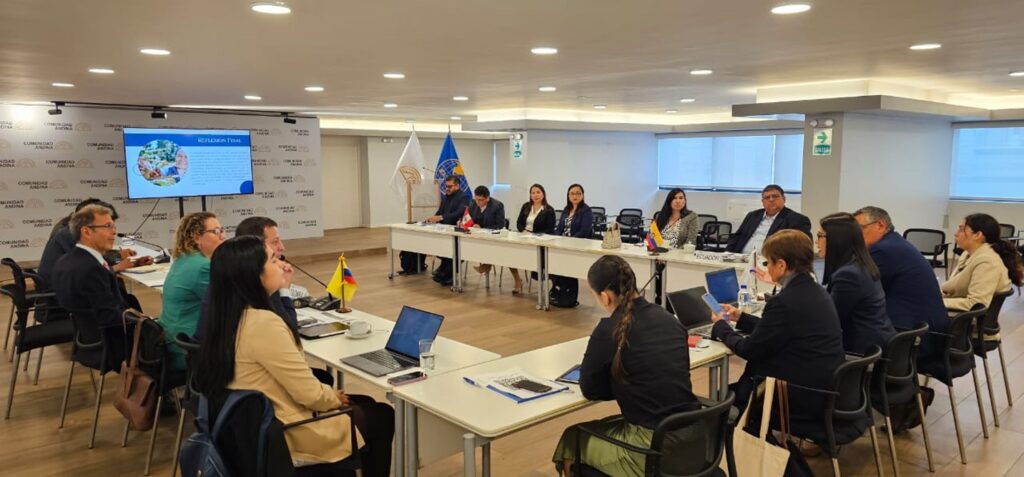
Lima, 13 December 2024 (IICA) – Government officers in charge of agrifood trade policy in the ministries of Agriculture and Livestock and of Foreign Trade in the Andean Community (CAN) member countries participated in an initial capacity building meeting on international agrifood trade, which was organized jointly by the General Secretariat of the Andean bloc and the Inter-American Institute for Cooperation on Agriculture (IICA).
The aim of the activity, which was held at the Headquarters of the General Secretariat of the Andean Community in Lima, was to analyze the main mechanisms and principles that foster international agrifood trade and regional economic integration in CAN, as a means of fostering more effective participation in international forums and joint actions to strengthen agrifood systems, as well as to facilitate access to regional and international markets.
The meeting provided officials from Bolivia, Colombia, Ecuador and Peru with relevant and up-to-date technical information about international trade regulations and the current status of agricultural trade negotiations. It also highlighted the importance of strengthening intraregional trade and addressing the new challenges and opportunities facing countries, given the emergence of rules, regulations and actions that could potentially restrict agrifood trade in the countries of the region.
Likewise, it stressed the importance of redoubling efforts to address the new international trade issues arising from the interaction between production, international trade, gender, climate change and bioeconomy.
Manuel Chacón, Director of Economic Integration at the Ministry of Trade, Industry and Tourism of the Republic of Colombia and President pro tempore of the Andean Community, pointed out the value of the training, noting that, “IICA has done a remarkable job, given that they are many gaps in the agricultural negotiations, particularly in terms of entities that are not directly involved. We, at the Ministry of Trade, value these forums that not only allow us to meet other CAN participants, but also to deepen our knowledge about key aspects of the WTO negotiations. We firmly believe that these types of initiatives strengthen regional integration”.
Gloria Abraham, Senior Consultant to IICA, underscored the importance of the initiatives spearheaded by the Andean Community in partnership with the Inter-American Institute for Cooperation on Agriculture. These actions seek to strengthen the technical capacities of the region’s ministries of the Economy and Agriculture, to foster stronger and more effective agricultural integration in international markets.
“I believe that CAN’s initiative to organize a training session and capacity building workshop for technical specialists in international agrifood trade from the ministries of the Economy and Agriculture of the Andean Community, with the technical support of IICA, was brilliant”, she noted.
In addition to highlighting the gains that the regional had achieved in the trade agenda, Abraham emphasized the need to undertake fundamental tasks to strengthen intraregional trade and participation in international forums, to increase diversification in the exportable supply and to incorporate emerging issues.
She acknowledged that, “Naturally, much remains to be done. For example, we must focus on improving the participation of the countries in the World Trade Organization (WTO), fostering intraregional trade and diversifying the exportable supply to generate products with greater added value. There are new issues in international trade that must be incorporated into the agenda, such as issues regarding trade and gender, the bioeconomy, the circular economy and new environmental regulations”.
Agrifood trade policy in the Andean Region is facing critical challenges and opportunities, particularly in the framework of regional and multilateral integration mechanisms. In this context, the Andean Agricultural Committee, through various initiatives, is working to align national policies with international considerations, addressing key issues, such as market access, gender, environmental sustainability and inter-institutional cooperation.
Francisco Suasti, Technical Secretary of the Andean Agricultural Committee, stressed the importance of coordinating agrifood trade policies: “It is fundamental that we integrate national and subregional agendas, addressing key emerging issues, such as trade and gender, new environmental regulations and key tools to facilitate market access. Collaboration between member countries and organizations such as IICA strengthens the exchange of knowledge and lessons learned, thereby further consolidating Andean regional integration”, he noted.
IICA’s training has played a key role in strengthening the Andean region’s agricultural negotiation capacities. These initiatives assist in bridging knowledge gaps and promoting collaboration among CAN member countries, fostering an integrated and coordinated approach in agricultural trade policies.
During the meeting, the participants identified a series of technical cooperation actions in international agrifood trade and regional economic integration, which would provide continuity in the process that had begun with this joint activity between the CAN General Secretariat, IICA and the representatives of the Andean countries.
The activity was organized within the framework of IICA’s technical cooperation agenda for the General Secretariat of CAN and its member countries, to support the implementation of the Andean Agricultural Agenda, the key areas of focus of which include International Trade, Family Farming, Gender, Climate Change, Bioeconomy, Agricultural Health and Food Safety.












